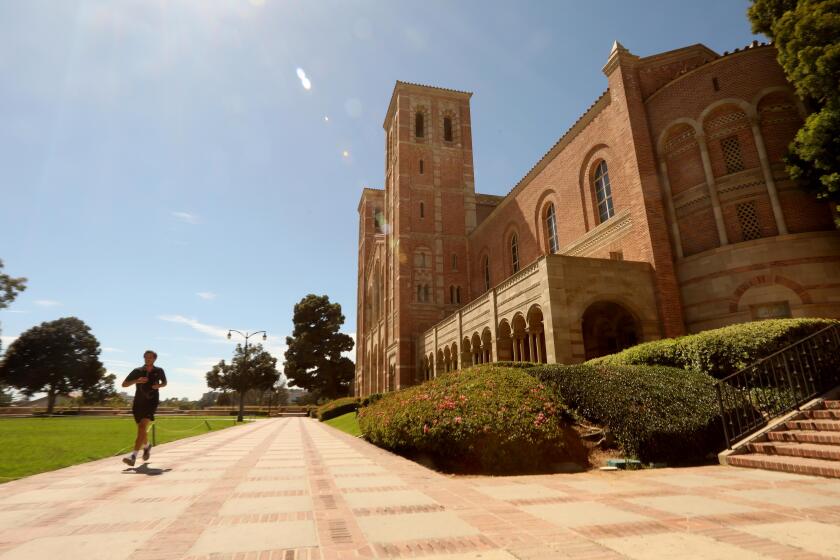Jury Convicts Tax Adviser Who Supplied Bogus Shelters
A federal jury Tuesday convicted Huntington Beach tax adviser Charles D. Spurrier--who ran an investment service that enrolled 5,800 Californians in bogus tax shelter schemes--of tax evasion, fraud and helping others file false income statements.
âA revolting development,â was Spurrierâs only comment after the verdict in the Santa Ana courtroom of U.S. District Judge J. Spencer Letts.
Spurrier faces a maximum prison sentence of 39 years.
The unusual defense for Spurrier, 67, sought to intertwine his tax consulting work with his devout faith in the Church of Jesus Christ of Latter-day Saints. Three present and former Mormon bishops testified as character witnesses for him.
And his lawyer, William A. Dougherty, argued that books written by Mormon Church President Ezra Taft Benson, a former secretary of agriculture, questioning the U.S. income tax system, were unusually persuasive and led Spurrier to believe his tax schemes were legitimate.
âIn fact, it was almost attempting to make his views on the tax system a matter of his religious beliefs,â said John C. Belcher, a federal prosecutor from Washington, who tried the case. âThey were definitely trying to turn it into a First Amendment case.â
Also convicted Tuesday were two co-defendants: Spurrierâs son, Dennis C. Spurrier, 34, of Huntington Beach, who now faces a maximum of 17 years in prison, and Thomas R. Smith, 37, of Orange, who could be sentenced to 19 years.
Spurrierâs conviction brought to seven the number of participants in the Trust Management Group scheme who have been found guilty. On Dec. 6, Leon G. Hill and Wayne G. Hill, both Spurrierâs nephews, and Hyrum J. Amundsen Jr. and his wife, Eva, were convicted of various federal charges.
Among several schemes was one in which clients were told that by signing âpersonal services contractsâ with Spurrier they could transform their paychecks into non-taxable gifts. For a fee, Spurrier and his staff of tax advisers and salesmen enrolled clients who often turned over all their income to the firm. In return, the firm paid back to the investors 90% of what they contributed--in the form of supposedly tax-free gifts. Government authorities said there were virtually no circumstances under which a program to turn wages into tax-free income could be legal.
Spurrierâs operation allegedly took in $11.2 million and returned $10.1 million in such âgifts.â The program was created by Frank Forrester of New York, who was convicted of criminal contempt of court in 1984 for refusing to stop promoting the scheme.
Belcher argued that Spurrier sold the âcrazy ideaâ to people with little tax expertise by âusing a lot of legal jargon the investors didnât understand.â Among the 14 victims who testified were a physician, two engineers and two college professors. The Internal Revenue Service said the amount of total income understated by the victims was $365,000.
When it indicted Spurrier earlier this year, the federal grand jury also alleged he illegally promoted a second tax shelter in which people were assured they could legally convert their status to ânon-taxpayers.â The scheme was created by Burton D. Linne of Arlington, Va., who is now serving a 5-year prison term for tax-related offenses. Some 23 investors paid $42,500 to Spurrier for forms, newsletters, tapes and other tax preparation advice, according to prosecutors.
In a third variant, Spurrier marketed 30-minute television shows, with investors paying $12,000 and signing a $91,000 note. Shows were actually produced, according to the government. The investor would claim a sizable investment tax credit, interest deductions and depreciation of the investment over 7 years--all providing substantial sheltering of income from taxes.
But the IRS ruled the scheme invalid, questioning the value of the films and finding that the program had no economic substance except tax avoidance.
While Spurrierâs main defense was that he believed the scheme was legitimate, Belcher noted what he called an appeal to the juryâs sympathy on behalf of the defendant.
âHe testified about his 33 grandchildren. His family was sitting in the courtroom at all times, sometimes 20 of them, near the jury,â Belcher said.
Dougherty said Spurrier would appeal the case. Shortly after the verdict Tuesday, Dougherty filed motions for a new trial based on the claimed misconduct of one juror, who allegedly failed to disclose he was acquainted with Spurrierâs son.
More to Read
Sign up for Essential California
The most important California stories and recommendations in your inbox every morning.
You may occasionally receive promotional content from the Los Angeles Times.









